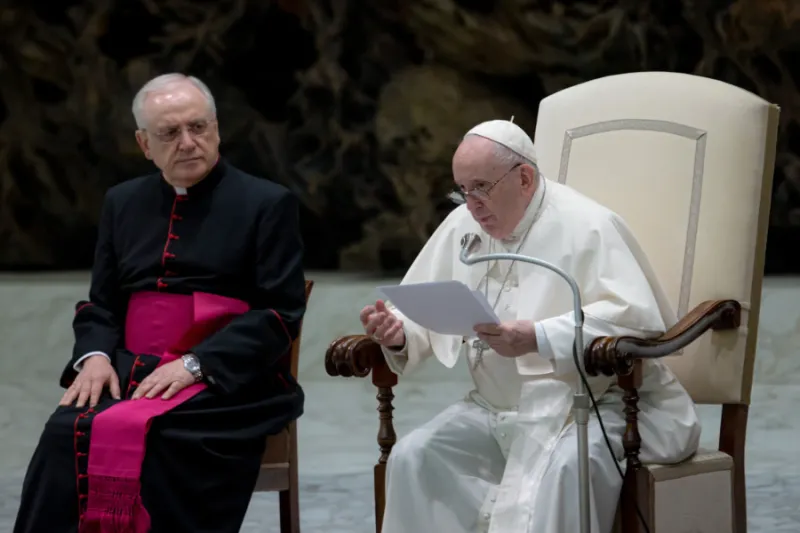
Vatican City, Jan 19, 2022 / 05:10 am (CNA).
Pope Francis has encouraged people to encounter God’s mercy in the Sacrament of Reconciliation, with a reminder that the tender forgiveness of God is greater than the “ugliest” sin.
“God is not afraid of our sins, he is greater than our sins,” the pope said in his general audience on Jan. 19.
“God always forgives: put this in your head and heart. God always forgives. We are the ones who get tired of asking for forgiveness. But he always forgives, even the ugliest things,” he said in the Vatican’s Paul VI Hall.
Speaking about God’s tenderness and mercy, Pope Francis said that the “things of God always reach us through the mediation of human experiences.”
“Tenderness is the best way to touch what is fragile in us. Look how nurses touch the wounds of the sick: with tenderness, so as not to hurt them more. And so the Lord touches our wounds with the same tenderness,” he said.
“This is why it is important to encounter God’s mercy, especially in the Sacrament of Reconciliation, in personal prayer with God, having an experience of truth and tenderness.”
The pope said that God’s tenderness is “greater than the logic of the world” and can be “an unexpected way of doing justice.”
“Without this ‘revolution of tenderness’ … we risk remaining imprisoned in a justice that does not allow us to get up easily and that confuses redemption with punishment,” he said.
At the end of his live-streamed audience, the pope’s thoughts turned to those who are in prison today.
“For this reason, today I want to remember in a special way our brothers and sisters who are in prison,” he said.
“It is right that those who have made a mistake pay for their mistake, but it is equally right that those who have made a mistake can redeem themselves from their mistake.”
“There can be no condemnations without windows of hope. … Let us think of our brothers and sisters in prison, and we think of God’s tenderness for them and we pray for them, so that they may find in that window of hope a way out towards a better life.”
This was Pope Francis’ eighth audience in a cycle of catechesis on St. Joseph that he launched in November 2021.
The pope dedicated this week’s general audience to a reflection on the saint as “a father of tenderness.”
As a part of this theme, he reflected on a Bible verse from the Book of Hosea (11:3-4): “He taught him to walk, taking him by the hand; he was for him like a father who raises an infant to his cheeks, bending down to him and feeding him.”
“It’s beautiful, this description from the Bible that shows God’s relationship with the people of Israel. And it is the same relationship we believe St. Joseph had with Jesus,” he said.
Pope Francis offered the following prayer to St. Joseph at the end of the audience:
St Joseph, father in tenderness,
teach us to accept that we are loved precisely in that which is weakest in us.
Grant that we may place no obstacle
between our poverty and the greatness of God’s love.
Stir in us the desire to approach the Sacrament of Reconciliation,
that we may be forgiven and also made capable of loving tenderly
our brothers and sisters in their poverty.
Be close to those who have done wrong and are paying the price for it;
Help them to find not only justice but also tenderness so that they can start again.
And teach them that the first way to begin again
is to sincerely ask for forgiveness, to feel the Father’s caress.
Amen.
If you value the news and views Catholic World Report provides, please consider donating to support our efforts. Your contribution will help us continue to make CWR available to all readers worldwide for free, without a subscription. Thank you for your generosity!
Click here for more information on donating to CWR. Click here to sign up for our newsletter.





Francis would know this how?
“God is not afraid of our sins, he is greater than our sins.’
Absolutely. Every Catholic knows this. To begin with, the Father sent Jesus into our world in which sin had played havoc. Then, Jesus conquered sin and death.
More pablum and rubbish from the arch-heretic in Rome.